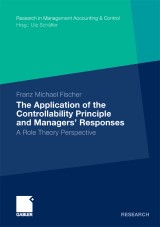Details

The Application of the Controllability Principle and Managers' Responses
A Role Theory PerspectiveResearch in Management Accounting & Control
|
53,49 € |
|
| Verlag: | Gabler |
| Format: | |
| Veröffentl.: | 24.07.2010 |
| ISBN/EAN: | 9783834960306 |
| Sprache: | englisch |
| Anzahl Seiten: | 318 |
Dieses eBook enthält ein Wasserzeichen.
Beschreibungen
The starting point of Franz Fischer’s dissertation thesis is the long-established claim to hold people accountable only for what they can control. Whereas early publications take the application of the so-called controllability principle as a matter of course, subsequent works justify the principle’s application with the help of psychological or social psychological findings: The violation of the controllability principle is supposed to have negative motivational effects and thus decreases managers’ effort on the job. Recently, however, doubts have been raised about the principle’s meaningfulness. Also, empirical studies show that the principle is frequently not applied in corporate practice. In short: We do not have satisfactory knowledge about the effects of the principle’s application or nonapplication on managers’ mental models and their behavior. At the same time, we recognize that the question of whether or not to apply the principle is a major issue for management control in organizations of all sizes. In view of this, Franz Fischer’s dissertation thesis contributes to existing literature in at least three ways: First, Franz Fischer successfully adopts a role theory perspective in the investigation of cognitive, affective, and behavioral consequences of (not) applying the controllability principle in managers’ performance evaluation. Thus, he demonstrates that role theory enriches a stream of literature that has so far been dominated by motivational theories. Second, he introduces a new conceptualization and operationalization of the application of the controllability principle which depict this latent variable as a second-order construct.
Literature Review on the Controllability Principle.- to Role Theory.- Development of the Causal Models.- Development of the Research Design.- Empirical Results.- Discussion.- Conclusion.
Dr. Franz Michael Fischer completed his doctoral thesis at the Chair of Management Accounting and Control at the European Business School, Oestrich-Winkel. He works in the finance and accounting department of a large car manufacturer in Munich.
In recent works on the design of management control systems, interest in the controllability principle has seen a revival. Franz Michael Fischer investigates the effects of the principle’s application on managers’ responses. The author further explores the impact of several important contextual factors on the basic relationships and, thus, develops moderated mediation models. The results are based on interview data gathered from 12 managers and survey data from 432 managers which confirm most of the hypotheses. The data analysis reveals that the application of the controllability principle has a significant effect on role stress and role orientation which, in turn, are related to managerial performance and affective constructs.
In recent works on the design of management control systems, interest in the controllability principle has seen a revival. Franz Michael Fischer investigates the effects of the principle’s application on managers’ responses. The author further explores the impact of several important contextual factors on the basic relationships and, thus, develops moderated mediation models. The results are based on interview data gathered from 12 managers and survey data from 432 managers which confirm most of the hypotheses. The data analysis reveals that the application of the controllability principle has a significant effect on role stress and role orientation which, in turn, are related to managerial performance and affective constructs.
Diese Produkte könnten Sie auch interessieren:

Die Erfolgsfaktoren des Change Managements. Am Beispiel des schwedischen Möbelriesen IKEA

von: Johanna Otto

15,99 €
















